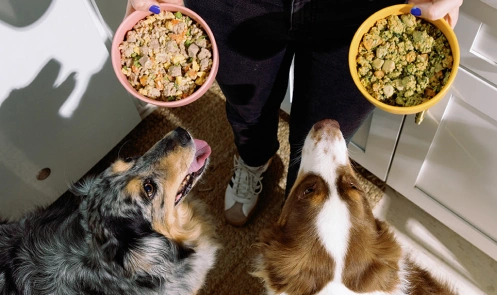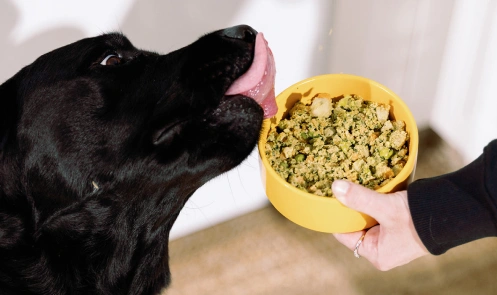Learn : Food & Nutrition
What is the Best Meat for Dogs? Healthy Proteins for Dogs | Nom Nom
When it comes to serving your dog a nutritious diet, protein is a key ingredient.
“High-quality, highly digestible protein is essential in a dog’s diet,” confirms veterinary nutritionist Sally Perea, DVM, MS, DACVIM. “Undigested proteins that reach the lower gastrointestinal tract (colon) can promote the growth of negative bacterial species. It can also lead to the production of fermentation by-products, such as ammonia, branched-chain fatty acids (BCFAs), indoles and phenols. These byproducts can adversely affect stool quality and odor.1”
That said, not all meats are created equal. The best meat for dogs depends on factors like digestibility, nutrient content and any dietary needs your pup may have. From lean poultry to protein-rich beef, each option offers unique benefits. In this article, we’ll explore healthy meats for dogs, helping you choose the right protein source to support your pup’s overall well-being.
Key Takeaways
-
Dogs thrive on high-quality protein to support muscle health, energy levels and overall well-being.
-
Chicken, turkey and fish can each provide a lean source of protein for weight support.
-
Proteins such as pork, lamb, venison, duck and rabbit can be a good alternatives for dogs who respond poorly to chicken or beef.
-
Knowing the nutritional benefits of different meats can help support a well-balanced diet for your dog.
-
Commercially prepared, gently cooked diets free of fillers or additives may be a healthy option for your pup.
_______________________________________________________________________
Understanding Dogs' Nutritional Needs
While an important element of a dog’s diet is high-quality protein, they also need essential fats, vitamins and minerals to stay healthy.
Ensuring they get the right balance of nutrients is an important step towards a healthy, active life. This is why gently cooked diets like Nom Nom take a dog’s unique nutritional needs and calorie requirements into account when recommending and pre-portioning their meals.
Dogs as Omnivores
-
Dogs are classified as omnivores, meaning they do well on diets that include both animal and plant-based nutrients. Meat provides essential protein and amino acids, while fruits, vegetables and grains contribute fiber, vitamins and antioxidants that support digestion and immune function. A balanced diet incorporating both sources helps dogs receive the full spectrum of nutrients they need for optimal well-being.
-
Meat serves as a primary source of high-quality protein, which is crucial for muscle maintenance and energy production. It also contains vital nutrients like iron, zinc, and B vitamins. Including lean meat in your dog’s diet may help support strong muscles, a healthy coat and overall vitality. “While vegetable proteins can be beneficial, they must be carefully balanced with complementary proteins to ensure that all essential amino acids are provided in the appropriate quantities,” Dr. Perea stresses.
Essential Amino Acids in Meat
-
Animal proteins provide essential amino acids that dogs cannot produce on their own. “It’s crucial to formulate a dog’s diet with protein sources, or a combination of sources, that fulfill all of the dog’s essential amino acid requirements,” Dr. Perea says. “Animal proteins, such as beef, chicken, turkey, and pork are excellent complete protein sources for diets aimed at healthy growth and adult maintenance.”
-
Amino acids are the building blocks of protein, and certain essential ones—such as arginine, histidine, and lysine—can play important roles in a dog’s health. Arginine supports cardiovascular function and helps remove toxins from the body, histidine is vital for growth and red blood cell production, and lysine aids in calcium absorption and muscle maintenance.
-
Meats like chicken, turkey, beef and fish provide some of the most complete amino acid profiles for dogs, helping to ensure they receive all the essential nutrients needed for optimal health. Beef and poultry offer a well-balanced blend of amino acids to support muscle development and overall well-being, while fish is rich in lysine and can also provide beneficial omega-3 fatty acids.
Consulting a Veterinary Nutritionist
-
Consulting a veterinary nutritionist like Dr. Perea — who helps formulate Nom Nom’s gently cooked recipes — can be beneficial when making significant changes to your dog’s diet, as they can help ensure balanced nutrition and prevent deficiencies. Professional guidance is especially important when introducing new proteins or switching between different types of diets.
-
Dogs with special dietary needs may require tailored meal plans to meet their unique nutritional requirements. A veterinary nutritionist can recommend the best protein sources along with supplements like probiotics to support your dog’s health.
Evaluating Protein Quality in Dog Meats
Factors like amino acid profile, digestibility and nutrient density can help determine how beneficial a protein source is for your pup’s overall health.
Biological Value of Proteins
-
Biological value (BV) measures how efficiently a protein is absorbed and utilized by the body, with higher values indicating better digestibility and nutrient retention. Proteins with a high BV provide essential amino acids in optimal amounts, making them beneficial for muscle growth and overall health.
-
Eggs have the highest BV at 100, meaning they offer the most complete and easily absorbed protein for dogs, and why they’re included in Nom Nom recipes such as Beef Mash, Turkey Fare and the newest addition, Lamb Pilaf. Fish, with a BV of 92, is also highly digestible and rich in omega-3 fatty acids, while beef, at 80, remains a strong protein source with essential nutrients like iron and B vitamins.
______________________________________________________________________
Meat Choices for Dogs: Benefits & Considerations
Choosing meat for your dog involves considering both nutritional benefits and potential drawbacks. This section explores the top meat options, their advantages and key factors to keep in mind for a balanced diet.
Nutritional Benefits of Popular Proteins
-
Chicken: Chicken is a lean protein source that provides omega 6 fatty acids and amino acids to your pup's diet.
-
Beef: Beef is a healthy source of protein that sustains your dog's energy. Beef also provides essential fatty acids like omega-6.
-
Turkey: Turkey is a highly digestible protein source that also provides a good source of iron, zinc, potassium, phosphorus, pyridoxine (vitamin B6), and niacin (vitamin B3).
Nutritional Benefits of Less Common Proteins
-
Pork: Pork is a healthy, highly digestible source of protein and is great for pups that may have sensitivities to other proteins. Pork is also rich in thiamine, an essential vitamin used in cell-function.
-
Lamb: Another alternate choice to more common proteins, lamb provides healthy fats, vitamins like B12, and minerals like zinc, iron, and selenium, which support muscle development, skin and coat health and immune function.
-
Venison: This lean meat is good for weight management and digestion, and a good source of B vitamins and minerals such as zinc, phosphorus and iron.
Meat Choices Based on Your Dog’s Needs
Every dog has unique dietary needs based on factors like age, activity level and health. This section helps you choose meat options tailored to your dog’s specific nutritional requirements.
Best Meats for Puppies
Try Chicken or Beef
-
Rich in essential amino acids to support muscle growth and immune support.
-
Popular choices for potentially picky palates.
Best Meats for Senior Dogs
Try Turkey or Lamb
-
Easy to digest to support sensitive digestive systems.
-
Turkey is a lower fat option to help manage weight gain in older dogs.
Best Meats for Active Dogs
Try Beef or Pork
-
High in protein and essential fats to support muscle recovery and sustained energy.
-
Provides the iron and zinc needed to support stamina and endurance.
Best Meats for Dogs with Sensitivities
Try Pork or Lamb
-
Less common proteins may be beneficial for dogs who can’t eat chicken or beef.
-
Highly digestible and rich in iron for overall health.
Choosing the Right Meat for Your Dog
Selecting the right meat for your dog involves more than just choosing a protein source—it requires considering factors like age, activity level and overall dietary balance. This section explores how to prioritize high-quality sourcing, ensure proper nutrition and incorporate variety to support your dog’s long-term health.
Factors to Consider
-
A dog’s age, activity level, and specific dietary needs determine the ideal protein source and portion size.
-
Meat should be balanced with other essential nutrients like healthy fats, fiber and vitamins for optimal health.
-
Choosing high-quality meat can help ensure optimal nutrition.
Should You Feed Gently Cooked Dog Food?
-
Commercially made, minimally processed diets can help retain vital nutrients and help maximize digestibility.
-
Gently cooked diets like Nom Nom have been shown to support healthy digestion, shiny coats, high vitality and mealtime excitement.
-
Read the article What Does a Balanced Diet for Dogs Include? for more insights into creating a complete and nutritious meal plan.
FAQs About The Best Meat for Dogs
What meat is easy for dogs to digest?
Pork, turkey, fish and lamb are highly digestible proteins that are gentle on many dogs’ stomachs.
Can dogs eat pork?
Yes, they can eat lean, fully cooked pork (ideally accompanied by nutrient-rich veggies!)
Is lamb good for dogs?
Lamb is a nutritious protein source that's high in essential fatty acids.
Should I cook meat for my dog?
Cooking meat eliminates harmful bacteria but can reduce some nutrients, which is why Nom Nom gently cooks proteins to maintain a proper balance.
_______________________________________________________________________
Conclusion: Selecting The Best Meat for Your Dog’s Health
Providing your dog with high-quality protein is important for their overall health, and variety and balance can be too. Choosing meats based on your dog’s specific needs—whether they require lean proteins for weight management or proteins for sensitivities—can help ensure they receive the right nutrition. Remember, it’s always wise to consult a veterinarian before making major dietary changes.
Why Gently Cooked Dog Food Can Be an Excellent Choice
High Nutrient Retention: Less processing preserves essential vitamins and minerals for optimal health.Easy Digestion: Gently cooked food is gentle on the stomach, leading to healthy digestion and stool quality.
Customized to Your Dog’s Needs: Designed for your dog’s unique health requirements (and personal tastes).
By choosing gently cooked, high-quality dog food featuring a variety of proteins, you can provide your pup with optimal nutrition while ensuring every meal is tailored to their unique health needs.
-
Weber, M.P.; Biourge, V.C.; Nguyen, P.G. Digestive sensitivity varies according to size of dogs: A review. J. Anim. Physiol. Anim. Nutr. 2017, 101, 1–9.






 Ingredients for Allergy Relief in Dogs
Ingredients for Allergy Relief in Dogs
 Dogs Can't Live on Meat Alone
Dogs Can't Live on Meat Alone
 Are Dogs Carnivores?
Are Dogs Carnivores?